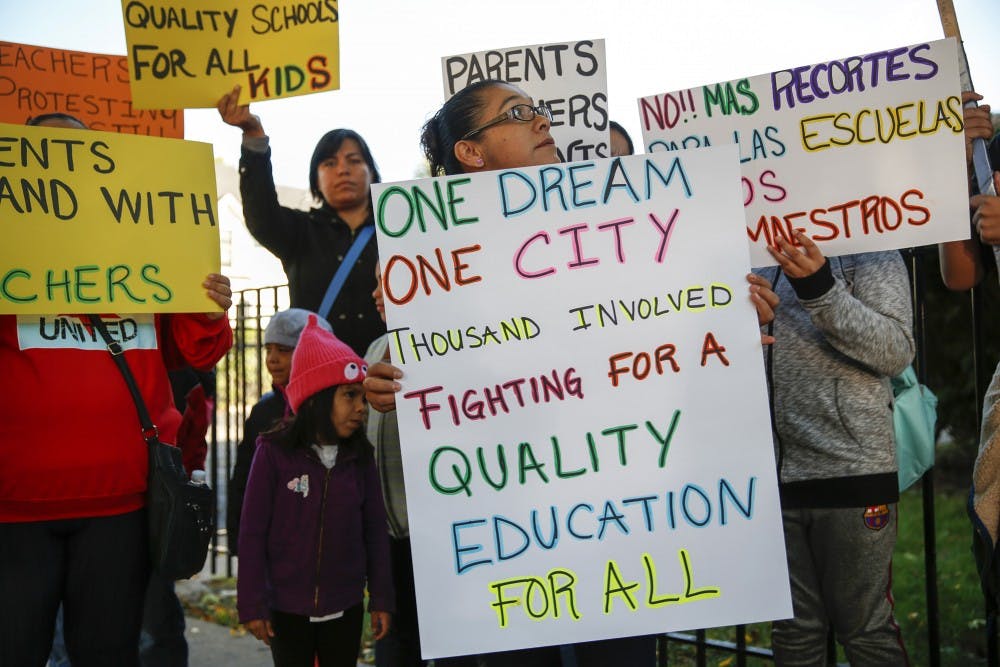Nationwide, teachers are protesting low pay and budget impacts that government funding have on both teachers and students. States like Oklahoma and Arizona have teachers’ unions striking and protesting on statehouse grounds. Many teachers are using the nine-day strike last month in West Virginia as a positive example. Teachers in West Virginia benefited from a 5 percent pay increase after their protests. The trend is spreading around the country, and many people in South Carolina should be wondering whether our teachers will be the next to get fed up.
Teachers in South Carolina get paid on average $48,375 per year, which is only 86 percent of the national average and puts South Carolina teachers in the 45th spot for worst states for teachers. USC has more than 2,000 students enrolled in undergraduate and graduate schools for education that could face the harsh realities of teaching while being underpaid and in schools that are under-equipped. In this way, it is important for students to understand state allocations of funds for education compared to other areas of funding.
The federal budget allotted $68.2 billion for education in 2017, a $67.1 million decrease from the amount allotted the year before in 2016. Under Trump’s education department's plan, there will be more focus and spending on giving students the choice of which public or private schools they want to go to rather than having to stay in their school zones. The plan also gives more support to charter schools and private schools that take students from low- performing public schools. The budget maintains past numbers for public schools in areas of poverty.
In South Carolina last month, a spending bill was passed in the House that approved a raise for South Carolina teachers that would make the minimum salary rise from $30,000 per year to $32,000 per year. The raise for teachers was prioritized over more money per student and over allocations to higher education funding that was requested. USC was one of the colleges requesting money, putting in a request of $50 million to help build a new medical campus. Five million dollars was approved and less was approved for other schools like USC Beaufort.
All of this is to say that consideration for teachers should be the focus of education spending, especially in South Carolina. With low pay, comes low work ethic for some. Teaching is the most important job there is, and when students with a passion for kids or teaching realize that they will be living paycheck to paycheck as a teacher, many are discouraged and choose to forgo the profession. According to the Economic Policy Institute, one person living in Columbia would have to earn at least $35,837 per year as a living wage to achieve an adequate standard of living. Even with the 2 percent raise for South Carolina teachers, some will be making less than that and this number does not account for teachers with families to support.
When thinking of the future of America, I believe our focus should be on raising upcoming generations with adequate education to increase the intelligence of our voters and future leaders. This would include making teaching a noble profession again, where teachers are adequately paid to match the level of dedication and skill needed to influence youths. With a higher pay grade, it is inevitable that the quality of teachers would rise, even in areas of poverty.
How can we go forward and impact the the salaries of teachers at this point? For starters, it is important to follow the state and federal spending to know what to petition for. Next, when matters become more dire, protests obviously have some impact, like in the cases for West Virginia teachers. Lastly, the levels of importance for specific education allocations is important to pay attention to. For example, I would focus spending more for teachers' salaries and per student budgets in areas of higher poverty rather than higher education, private and charter school funding.
Looking around at USC, I could not think of something worth spending $50 million on, when spending one million on a school in the infamous Corridor of Shame would have infinitely more impact.

